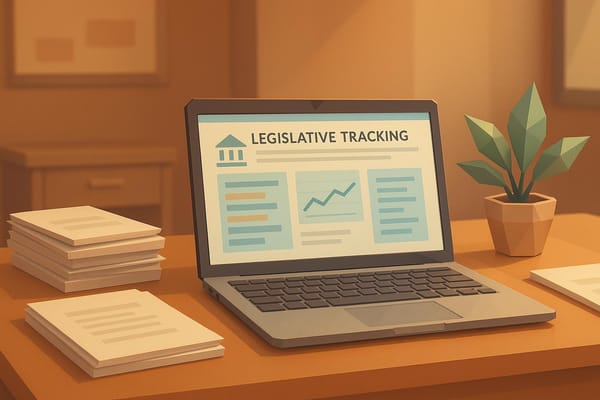8 Essential Tools for Effective Civic Engagement
Explore essential digital tools that enhance civic engagement, enabling citizens to track legislation, contact representatives, and stay informed.

Civic engagement in the digital era is easier than ever with tools that help you track legislation, contact representatives, and stay informed. Here's a quick rundown of 8 tools that empower you to participate in democracy effectively:
- Cicada.guide: Simplifies complex bills with AI summaries, tracks legislation, and offers action tools.
- OpenStates: Provides reliable, detailed state legislative tracking and alerts.
- GovTrack: Focuses on federal legislative updates and bill tracking.
- Ballotpedia: A hub for election information, candidate profiles, and voting guides.
- PopVox: Turns public opinion into messages for Congress, matched to your district.
- iCitizen: Localized updates, interactive polling, and campaign tools for grassroots participation.
- Democracy.io: A simple platform to contact federal representatives without needing an account.
- Countable: Combines legislative insights with one-click messaging to officials.
These tools make it easier to stay informed, take action, and hold representatives accountable. Whether you're tracking bills or contacting your lawmakers, these platforms help you engage with the political process efficiently.
Related video from YouTube
1. Cicada.guide
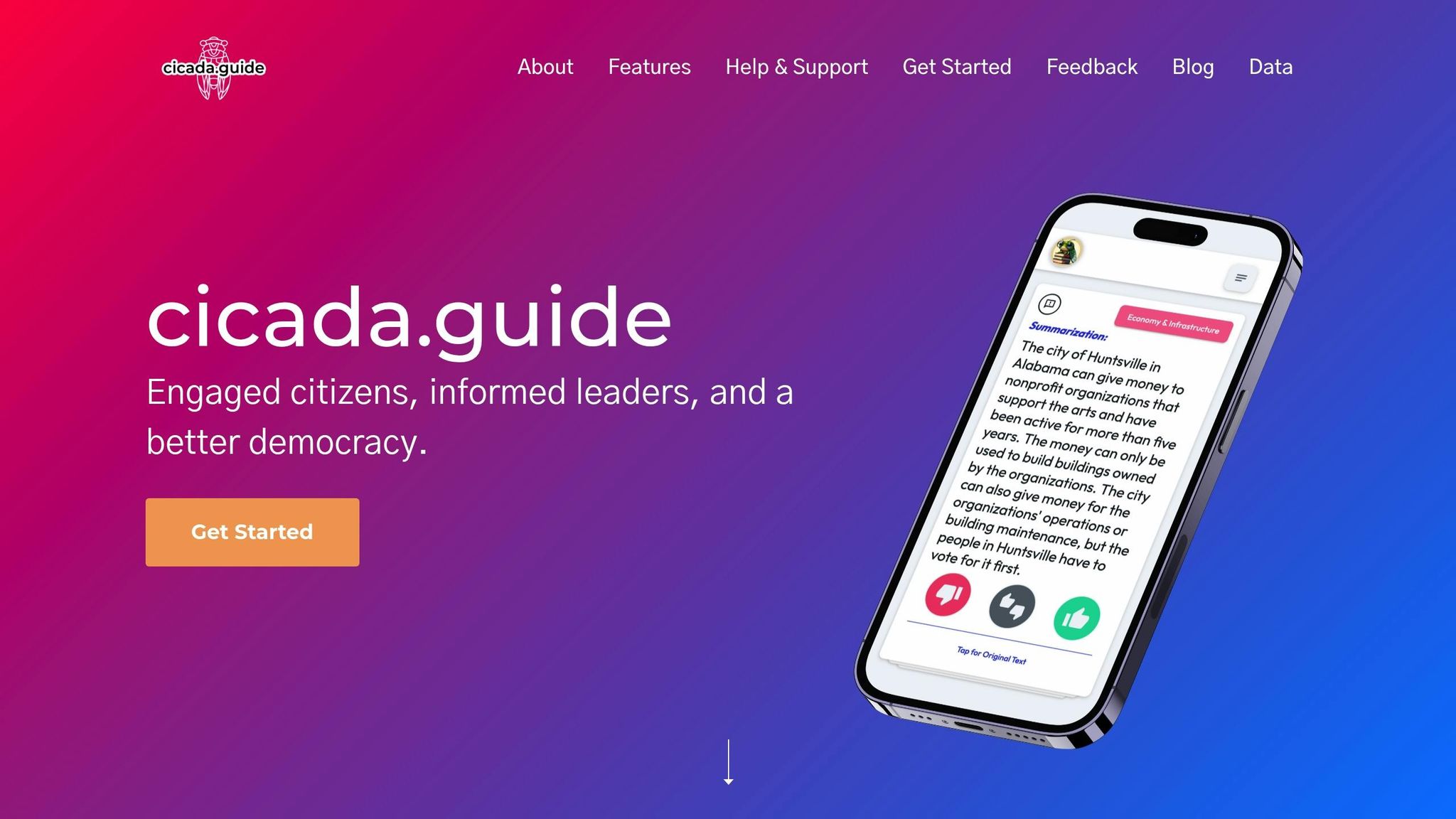
Cicada.guide makes getting involved in civic matters easier by using AI to break down complex bills into simple summaries and offering tools to track legislation at various government levels. It combines education with actionable tools, making it especially useful for those new to civic engagement.
The platform’s AI simplifies legal language into clear explanations, highlighting key points of proposed laws. It covers legislative tracking from local to federal levels across all 50 U.S. states. Users can stay informed with real-time updates through three personalized feeds:
- For You: Focused on your interests and location
- Discover: Highlights broader legislative topics
- Tracking: Keeps tabs on bills you’re following
Cicada.guide also makes it easy to take action. It provides communication tools with customizable templates and tracks response rates, helping users connect effectively with their representatives. Thanks to its AI-powered summarization, the time needed to analyze bills can be cut by 75%.
Here are some standout features:
- Alerts for bill updates and voting schedules, with calendar integration
- Visual tools to track legislative progress and representatives’ voting records
- Educational content that explains how the legislative process works
Cicada.guide has earned a 4.7/5 rating in the App Store. While basic access is free, a $9.99/month premium plan unlocks advanced analytics and detailed tracking of representatives.
Recognized by GovTech Magazine as a "Top Civic Tech Innovation of 2022", the platform also calculates value alignment scores for representatives. Its features align with the key goals of civic engagement: building awareness, enabling action, and ensuring accountability.
2. OpenStates
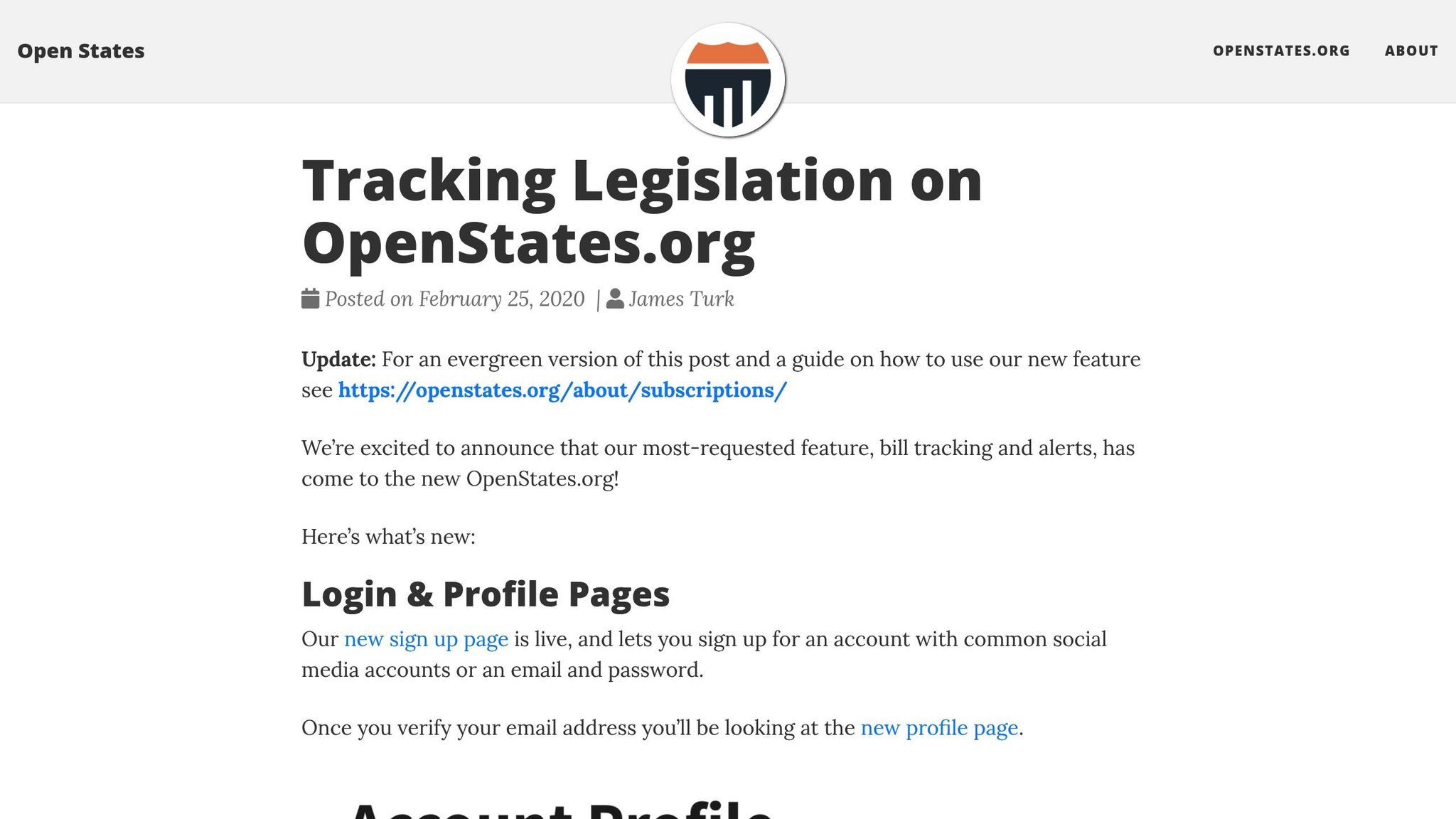
OpenStates focuses on tracking raw legislative data, making it an ideal tool for simplifying complex legislative processes and promoting transparent access to information. While Cicada.guide educates users, OpenStates excels in providing detailed, up-to-date legislative tracking.
What sets OpenStates apart is its impressive reliability. The platform boasts a 98% accuracy rate for bill information and updates 95% of its data on time. This level of precision is achieved through a mix of web scraping, official data feeds, and manual verification.
Here’s what OpenStates offers:
- Advanced search options: Look up bills by keyword, sponsor, or bill number.
- Legislator profiles: Access detailed voting histories and other insights.
- Custom alerts: Get notified about bill movements via email.
- Representative lookup: Find your lawmakers using your address.
- API integration: Perfect for developers needing legislative data.
In 2024, OpenStates played a critical role in advocacy efforts. GreenFuture used the platform to mobilize 10,000 California residents, helping pass a climate bill by just three votes.
Currently, OpenStates tracks over 1 million bills and 7,383 legislators, handling 30,000 API requests daily. The platform also prioritizes user privacy - basic features don’t require personal data.
"OpenStates has transformed state legislative engagement through accurate, accessible data" (OpenStates Blog, 2022)
3. GovTrack
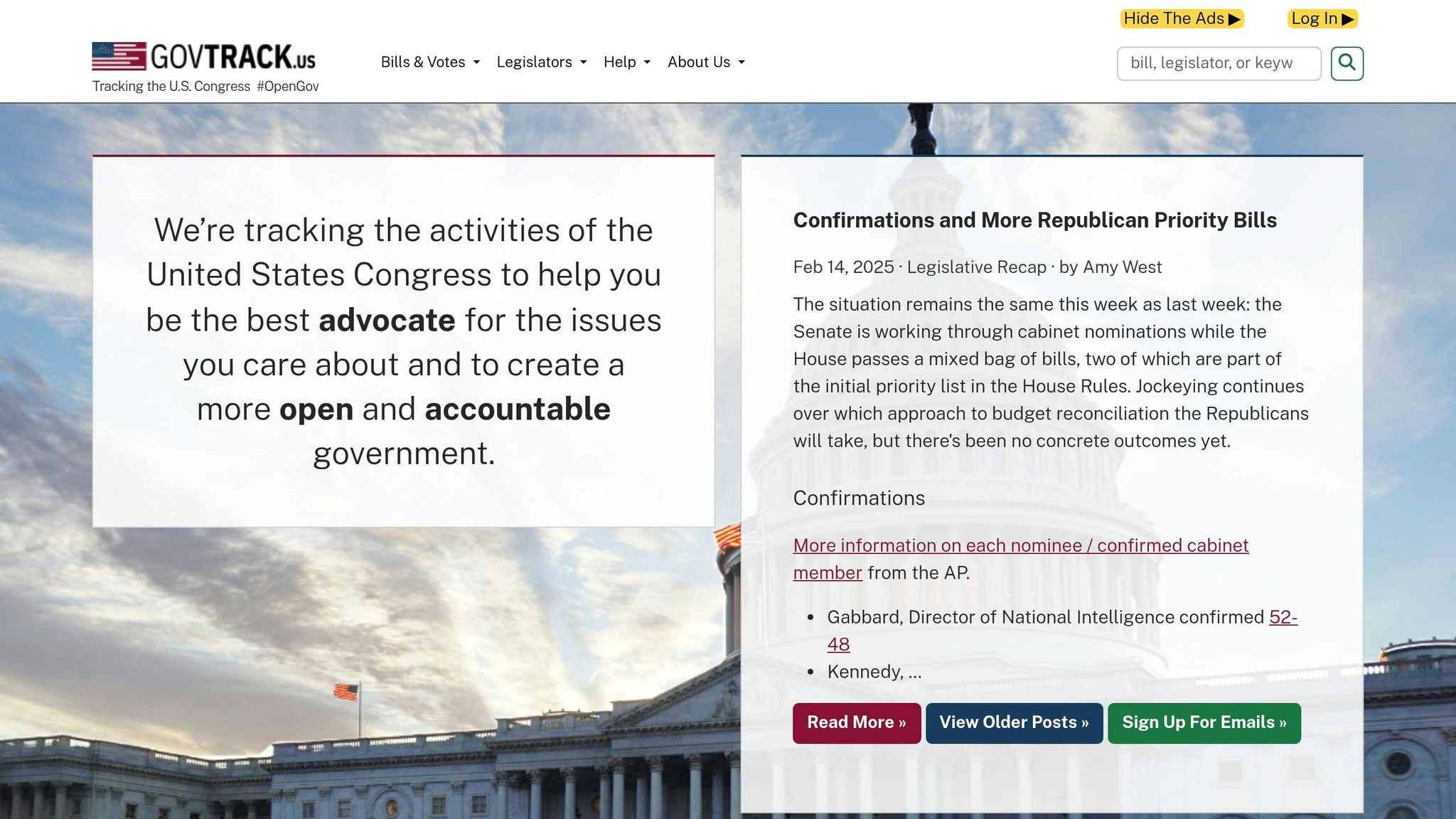
GovTrack is a widely-used platform for keeping tabs on federal legislative activity, attracting over 9 million unique visitors each year. Think of it as the federal-level equivalent of OpenStates, but instead of focusing on state legislation, it zeroes in on Congress. It’s a go-to resource for anyone looking to stay informed about congressional bills, voting records, and overall legislative transparency.
This platform tracks more than 10,000 bills during each Congress and uses machine learning to estimate the likelihood of a bill’s passage. This feature helps users concentrate on proposals that have a better chance of moving forward. According to a 2022 study, tools like GovTrack have boosted citizen engagement with legislative processes by 15% over a five-year span.
GovTrack is free to use and consolidates a wealth of congressional data into one easy-to-navigate interface, making it a powerful tool for civic participation. Key features include:
- Real-time updates on legislative progress
- Access to congressional voting records
- Custom notifications for specific bills
- Simplified summaries of complex legislation
4. Ballotpedia
Ballotpedia stands out as a go-to resource for election-related information, focusing on transparency in the electoral process - a key aspect of civic participation. During election periods, it attracts an impressive 1 million daily visitors.
Since its launch in 2007, Ballotpedia has provided nonpartisan coverage of elections at every level, from local school boards to presidential races. The platform features profiles for 520,000 officials and 305,000 candidates, supported by a team of over 50 skilled writers and researchers.
Here’s what makes Ballotpedia a valuable resource:
- Sample Ballot Lookup: See your actual ballot before election day.
- Election Calendar: Stay informed about upcoming elections and deadlines.
- Direct Quotes Tool: Find politicians' exact statements on key topics.
- Interactive Tools: Access datasets and research materials for deeper analysis.
During the 2020 election, Ballotpedia actively fought misinformation by verifying results in real time and offering state-specific voting guides. This focus on accuracy complements other legislative tools like Cicada.guide and OpenStates. The platform also maintains data on over 12,000 school districts and 100,000 school board members.
All information is rigorously fact-checked using primary sources. To stay informed, consider subscribing to Ballotpedia's free newsletter, which provides regular updates on elections and political developments.
5. PopVox
PopVox stands out by turning public opinion into direct communication with Congress. Launched in 2010 by former congressional staffer Marci Harris, this platform focuses on bridging the gap between citizens and their representatives, aligning perfectly with the idea of meaningful civic engagement.
With over 400,000 users, PopVox has delivered more than 2 million verified messages to Congress since 2021. Its address verification system ensures that messages are accurately matched to the correct congressional districts, making constituent outreach both precise and impactful.
Here’s a quick breakdown of what PopVox offers:
| Feature | What It Does |
|---|---|
| Bill Summaries | Provides neutral explanations with input from stakeholders |
| Sentiment Maps | Displays real-time public support or opposition ratios |
| District Matching | Ensures messages are sent to the right representative based on verified addresses |
A notable example of its influence is during the 2012 SOPA debate, where PopVox helped channel over 50,000 messages to Congress. This played a role in the bill’s eventual withdrawal, highlighting how public input can shape legislative decisions.
For advocacy groups, PopVox also offers tools like embeddable widgets and campaign tracking. These features allow organizations to rally supporters and measure their impact on legislative processes effectively.
6. iCitizen
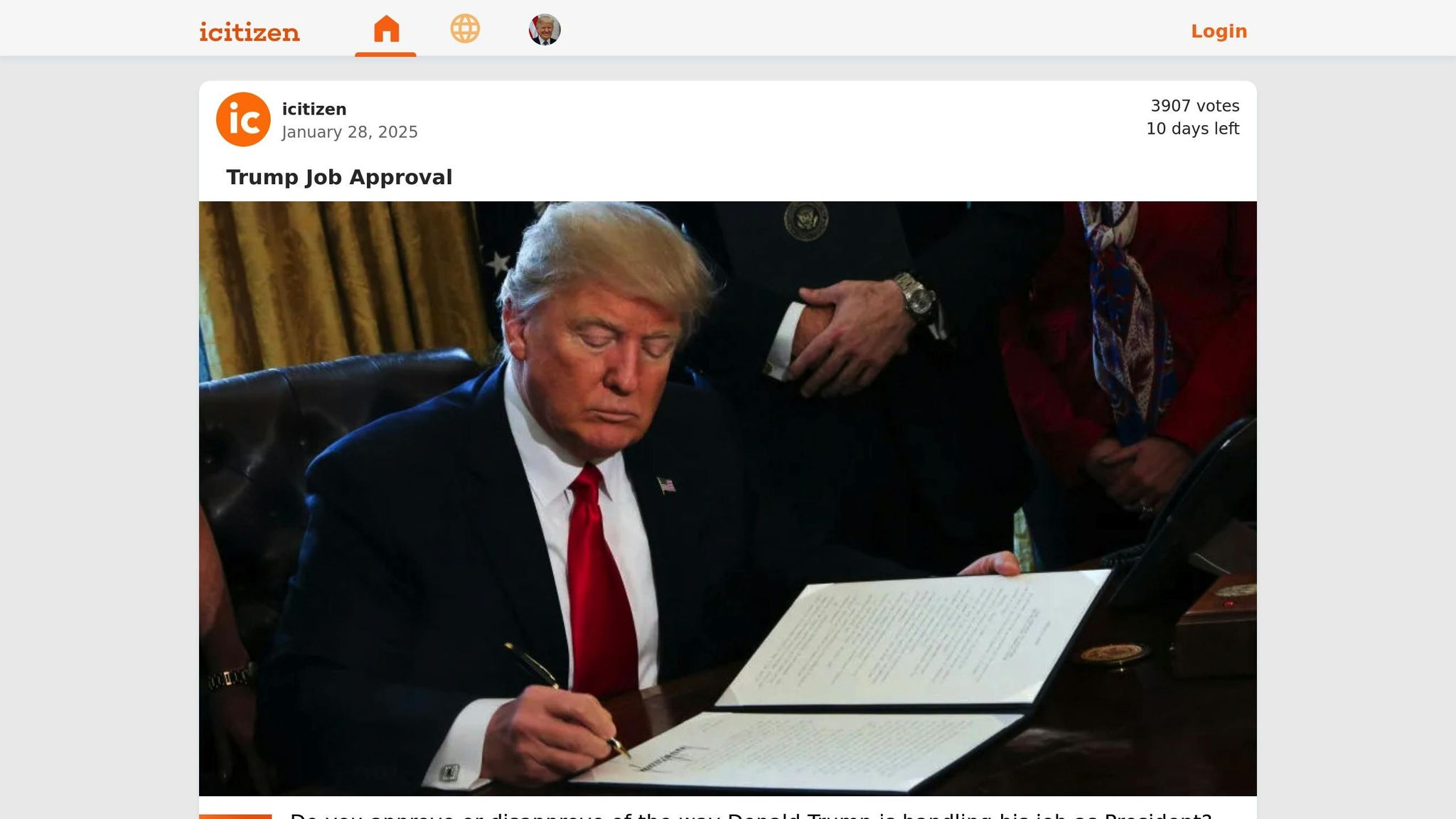
iCitizen focuses on grassroots participation, offering a mobile-friendly platform that connects people with their government. By 2021, it had over 130,000 registered users, making it a go-to tool for civic engagement.
Using geolocation, iCitizen delivers legislative updates tailored to users' specific districts. This localized approach ensures users stay informed about issues that directly affect their communities.
Here’s what sets iCitizen apart:
| Feature | What It Offers |
|---|---|
| District Matching | Personalized updates based on verified addresses |
| Interactive Polling | Real-time tools to share opinions on current issues |
| Campaign Tools | Features to help organizations rally their supporters |
The app’s intuitive design has earned it a 4.5/5-star rating on Apple’s App Store from 1.2K reviews.
Advocacy groups can use iCitizen to engage their audience with campaign tools. The platform also prioritizes security, offering end-to-end encryption and compliance with CCPA standards.
"iCitizen provides nonpartisan information on candidates and ballot measures", ensuring users can make well-informed choices without political bias.
7. Democracy.io
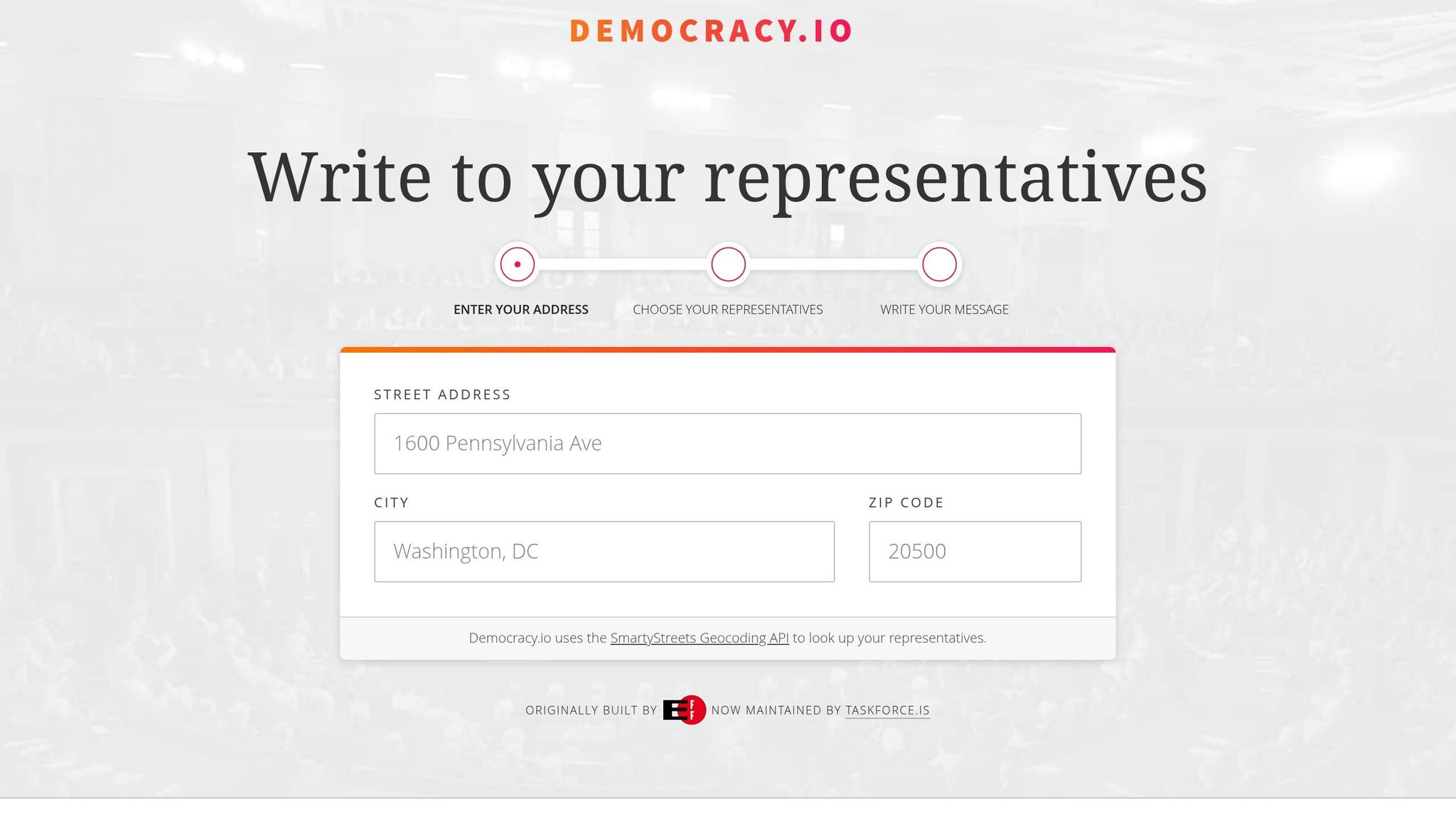
Created by the team at EFF, Democracy.io is a straightforward web tool designed to make it easier for people to reach out to their federal representatives. Unlike apps like iCitizen, this platform keeps things simple - no accounts needed.
Here’s how it works: You enter your address, and the site automatically connects you with your House representative and Senators. It even sends email notifications when you get responses. To help you get started, the platform provides message templates, but it also encourages users to write their own personalized messages.
Key features include:
- Matching you with the right representatives based on your address
- Email notifications when your representatives respond
- Pre-written message templates with options for customization
- Strong encryption and automatic data deletion after delivery
Democracy.io works well with tools like Cicada.guide and OpenStates, offering a direct way to take action after analyzing data or tracking legislative updates. Regular updates keep the platform aligned with congressional communication systems and ensure representative information stays current.
Note: This tool focuses only on federal representatives. For state or local officials, OpenStates is a better option.
8. Countable
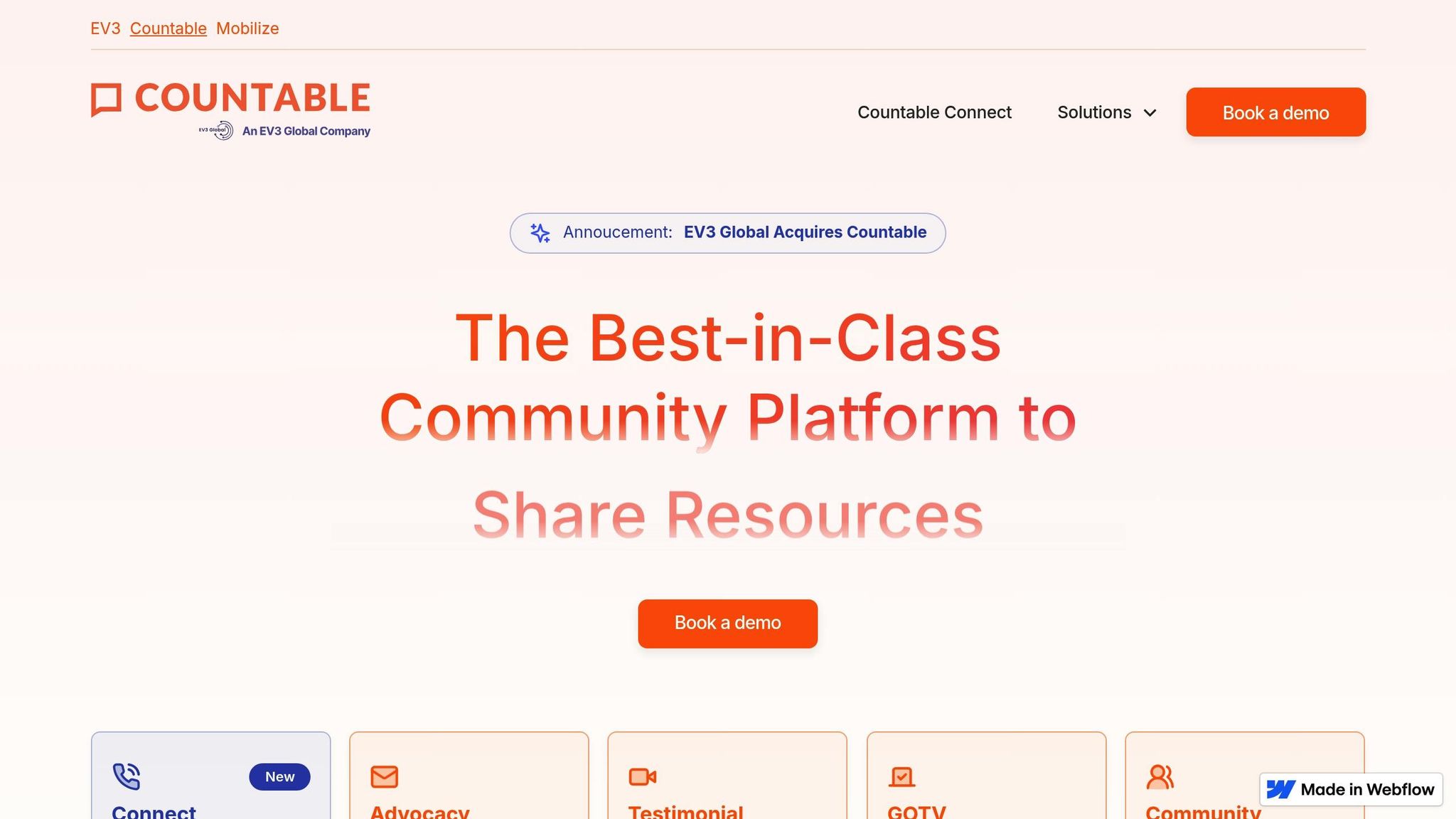
Countable simplifies legislative analysis and political engagement, connecting over 10 million users and facilitating more than 40 million messages to elected officials. Similar to Cicada.guide's AI summaries and PopVox's direct messaging, Countable merges legislative insights with tools for action into a single platform.
Here’s what the platform offers:
| Feature | Benefit |
|---|---|
| Easy-to-read bill analysis | Helps users quickly grasp key points |
| Voting record timelines | Shows how representatives vote |
| One-click messaging | Makes it easy to contact officials |
| Personalized issue feeds | Keeps users engaged on topics they care about |
All content is reviewed by policy experts and linked to original sources for transparency.
Impact in action: Countable has driven over 100,000 congressional messages during critical policy debates and boosted youth participation by 30%. This approach - moving from awareness to understanding to participation - reflects the article's core idea of fostering civic engagement.
Privacy and security are top priorities, with encrypted communications and optional anonymity features. This aligns with iCitizen's focus on secure civic participation.
Tip: Use Countable alongside Democracy.io to easily contact federal representatives after tracking relevant legislation.
Next Steps
About 35% of Americans use digital tools to connect with elected officials. The tools mentioned earlier offer various ways to get involved in civic activities.
Here's how you can make the most of them:
| Time Investment | Action | Expected Outcome |
|---|---|---|
| 15 mins/day | Follow one issue on GovTrack or OpenStates | Stay updated on specific legislation |
| 30 mins/week | Reach out to representatives via Democracy.io | Faster response rates (25-40%) |
| 1 hour/month | Explore local initiatives on Cicada.guide | Gain insight into community issues |
Start Small, Think Big
In 2022, Austin's SpeakUp initiative involved 4,800 residents using targeted tools, resulting in $1.2M allocated for community projects. Platforms like Cicada.guide and OpenStates can help replicate this kind of local engagement on a broader scale.
Create an Engagement Routine
- Enable mobile notifications for key updates
- Dedicate specific "civic time" in your schedule
- Join local online groups to exchange ideas and learn together
Take It to the Next Level
Consider exploring advanced features like Cicada.guide's representative analytics or OpenStates' API integration. These tools can help you track and measure your civic efforts more effectively.
Digital platforms are shaping the future of civic engagement. By starting with these tools today, you can ensure you're ready to make an impact in tomorrow's democracy. Use platform metrics to monitor your progress and stay motivated.


